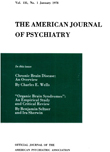Shock treatment, brain damage, and memory loss: a neurological perspective
Abstract
The author reviews reports of neuropathology resulting from electroconvulsive therapy in experimental animals and humans. Although findings of petechial hemorrhage, gliosis, and neuronal loss were well established in the decade following the introduction of ECT, they have been generally ignored since then. ECT produces characteristic EEG changes and severe retrograde amnesia, as well as other more subtle effects on memory and learning. The author concludes that ECT results in brain disease and questions whether doctors should offer brain damage to their patients.
Access content
To read the fulltext, please use one of the options below to sign in or purchase access.- Personal login
- Institutional Login
- Sign in via OpenAthens
- Register for access
-
Please login/register if you wish to pair your device and check access availability.
Not a subscriber?
PsychiatryOnline subscription options offer access to the DSM-5 library, books, journals, CME, and patient resources. This all-in-one virtual library provides psychiatrists and mental health professionals with key resources for diagnosis, treatment, research, and professional development.
Need more help? PsychiatryOnline Customer Service may be reached by emailing [email protected] or by calling 800-368-5777 (in the U.S.) or 703-907-7322 (outside the U.S.).



